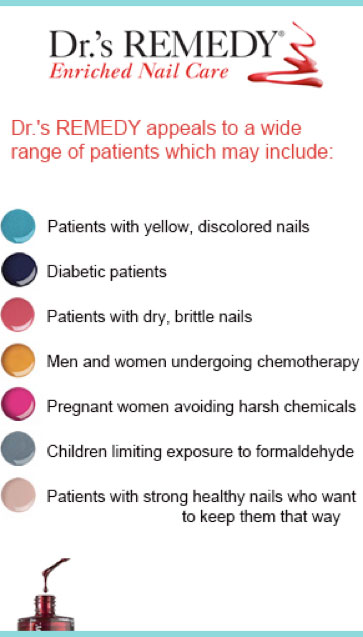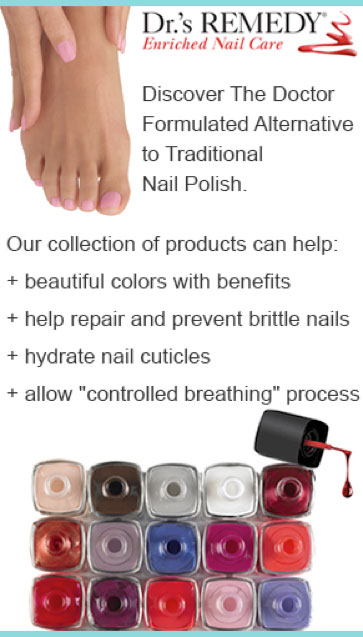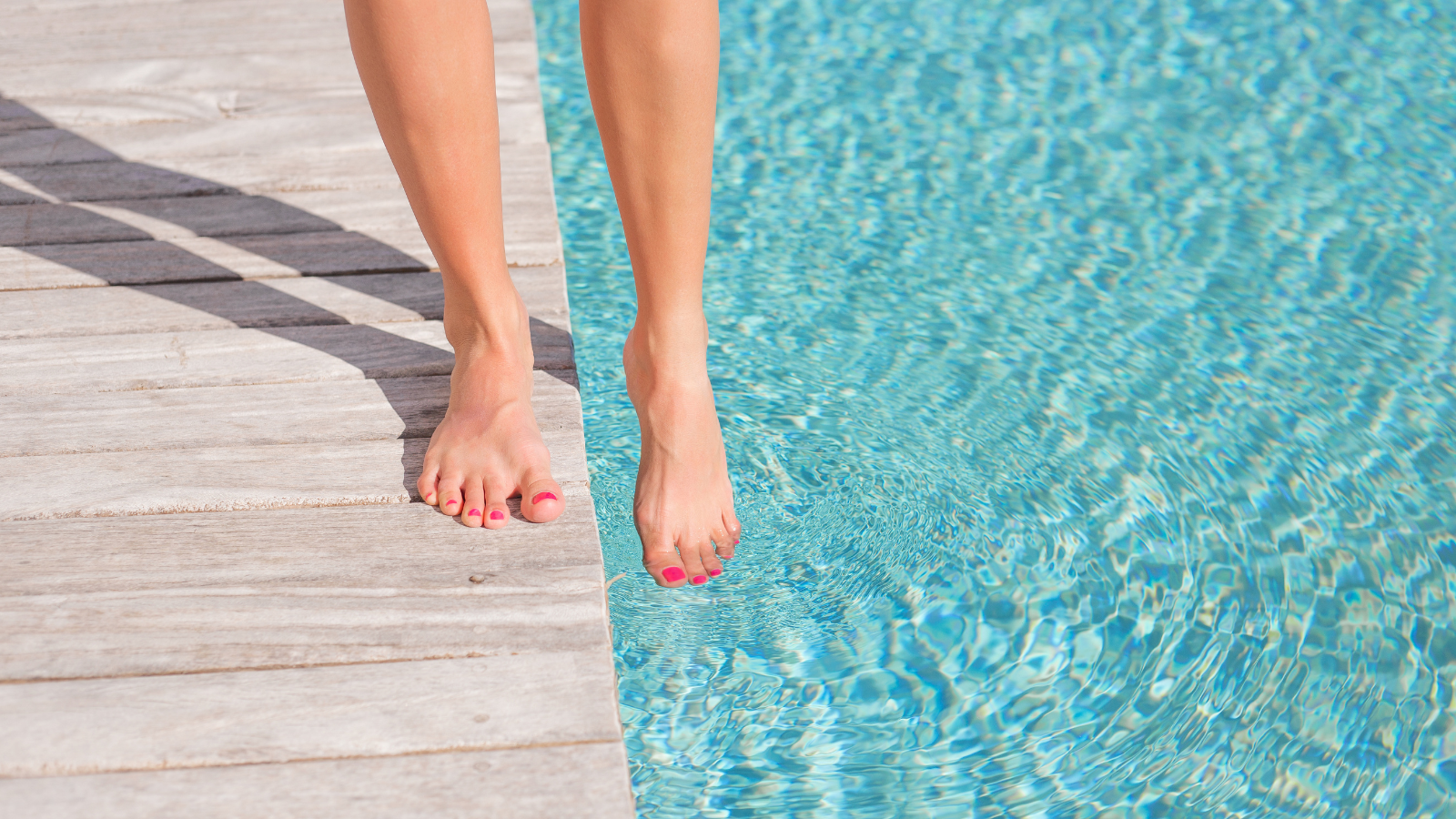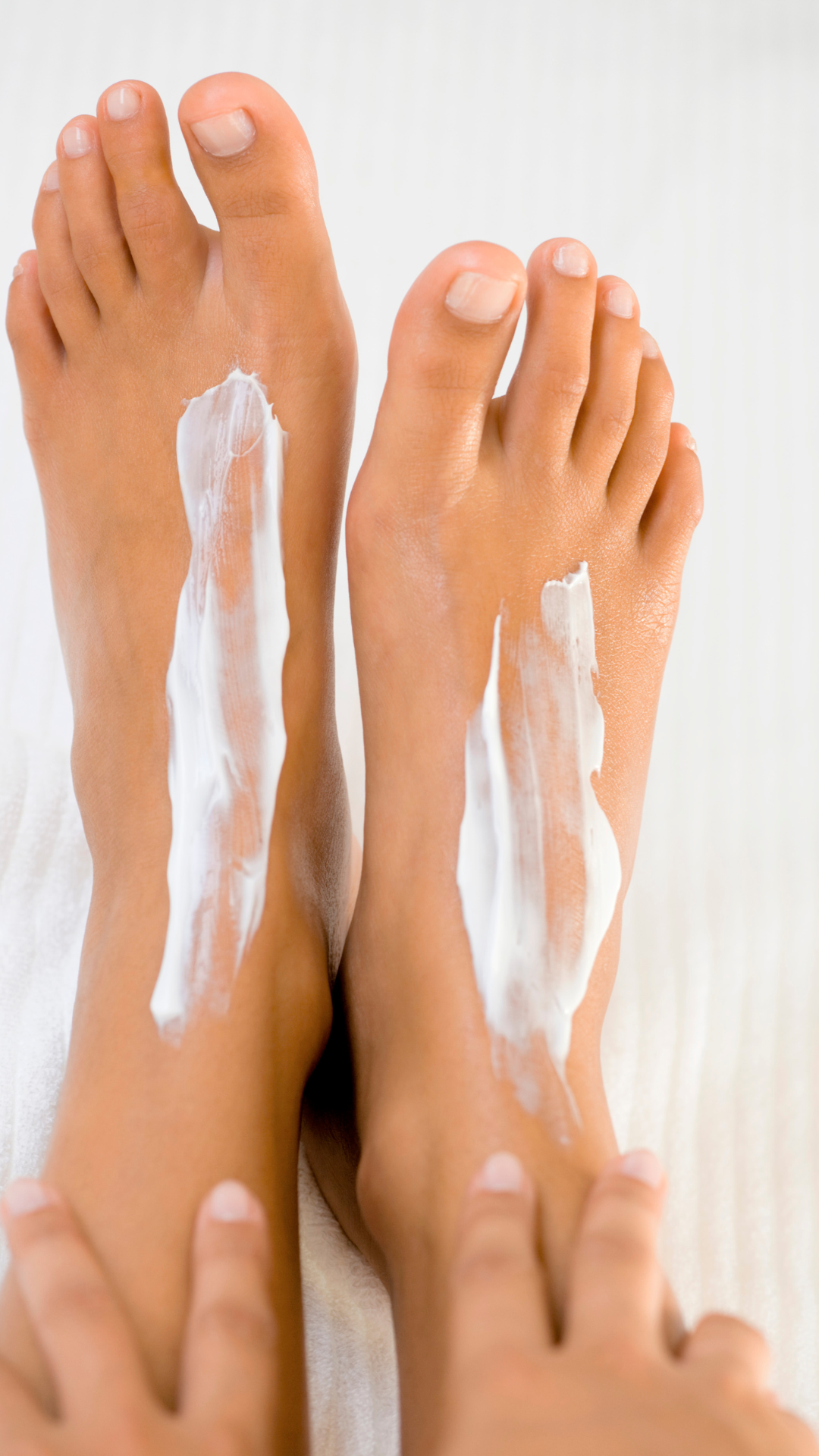Welcome to Dr.’s Remedy Enriched Nail Care
Podiatrist Formulated Nail Care
Brilliant Colours
Enriched Formula
Dr.’s REMEDY® is a line of podiatrist formulated nail care created by board certified podiatrists, Dr. Adam Cirlincione and Dr. William Spielfogel.
Our collection of products includes over thirty luxurious nail colours and as well as nail care solutions, which can minimize the appearance of dry brittle nails, hydrate nail cuticles and improve the wear-time of your nail colour.
Each product is infused with a special blend of ingredients selected by Dr. Cirlincione and Dr. Spielfogel.
This blend includes:
wheat protein,
tea tree oil,
garlic bulb extract and lavender.
Dr.’s Remedy is the best alternative nail care line for anyone who wants beautiful looking nails and wants to avoid formaldehyde, formaldehyde resin, toluene and DBP. Dr.’s Remedy is vegan friendly and utilizes a range of organic ingredients.
Vist us to see full range
 |
 |
Do you often find yourself dealing with persistent foot pain and wondering if your weight might be a contributing factor? If so, you're not alone. Foot pain can be a significant barrier to staying active and losing weight, creating a frustrating cycle that many people struggle to break. Understanding the connection between weight and foot health is crucial for finding effective solutions and improving your overall well-being.
The Link Between Weight and Foot Health
Carrying excess weight can put additional stress on your feet, leading to various foot problems. Here are some common conditions that can be exacerbated by being overweight:
Osteoarthritis
This degenerative joint disease can affect the feet, causing pain, swelling, and reduced mobility. Extra weight increases the pressure on your joints, accelerating the wear and tear process.
Type 2 Diabetes
Being overweight is a significant risk factor for type 2 diabetes, which can lead to complications such as neuropathy (nerve damage) and poor circulation. These issues can result in foot pain, ulcers, and infections.
Gout
Excess weight can increase uric acid levels in the blood, leading to gout. This form of arthritis causes sudden, severe pain, redness, and swelling in the joints, often starting with the big toe.
Common Foot Pain Conditions Related to Weight
Several specific foot conditions are more prevalent or worsened by carrying extra pounds,
Plantar Fasciitis
This condition involves inflammation of the plantar fascia, the band of tissue that runs along the bottom of your foot. Excess weight can strain this tissue, leading to heel pain and discomfort, especially upon waking up or after long periods of inactivity.
Posterior Tibial Tendonitis
This tendon supports the arch of your foot. When overburdened by extra weight, it can become inflamed or torn, resulting in pain along the inside of the ankle and foot.
Arthritis
Arthritis in the foot can cause significant pain and stiffness, particularly in the ankle and subtalar joint. Extra weight increases the load on these joints, worsening the symptoms.
Seeking Help from a Podiatrist
If you're experiencing foot pain and suspect that your weight may be a contributing factor, it's essential to seek professional help. A podiatrist can provide valuable guidance and treatment options to alleviate your pain and improve your foot health. Here are some ways a podiatrist can help,
Routine Foot Treatment
Regular check-ups and treatments can address issues such as calluses, corns, and nail problems, which can be particularly problematic for overweight individuals.
Foot Care Advice
Podiatrists can offer personalised advice on foot hygiene, exercises, and stretches to keep your feet healthy and pain-free.
Footwear Advice
Wearing the right shoes is crucial for managing foot pain. A podiatrist can recommend footwear that provides adequate support, cushioning, and stability to reduce strain on your feet.
Orthotics
Custom-made insoles or orthotics can help redistribute pressure, support your arches, and correct any biomechanical issues contributing to your pain. These devices can make walking more comfortable and help you stay active.
Breaking the Cycle
It's understandable that foot pain can make it challenging to engage in physical activities necessary for weight loss. However, taking the first step to address your foot health can create a positive feedback loop. As your foot pain decreases, you'll find it easier to incorporate more physical activity into your routine, which can help with weight loss and further reduce the strain on your feet.
Foot pain and weight are often interconnected, but with the right support and treatment, you can break the cycle and improve both your foot health and overall quality of life. Don't let foot pain hold you back—reach out to us for expert advice and personalised care. Together, we can develop a plan to alleviate your pain, support your feet, and take strides towards a healthier, more active lifestyle.
These are not just any socks
These are
The healthiest socks that you will ever wear.
Aetrex Copper Socks
Aetrex Socks, with Copper Sole™ Technology are
- Unsurpassed in comfort, performance, and protection.
- Clinically proven to help prevent bacteria, fungi, and odour.
- Improve skin texture and appearance.
Copper ions, embedded in the yarn and guaranteed to last for the life of the sock, provide superior protection and eliminate 99.9% of bacteria, fungi and odours commonly found in feet.
Read the amazing story of
how Copper Socks helped trapped
Chilean Miners, and remarkably
improved their skin conditions.
During the spring and summer months the skin around the heels can become dehydrated, hard and flaky due to sandal wear.
Heel fissures, also known as cracked heels, can be a cosmetic problem but can also be painful, bleed and lead to serious medical problems if infection enters the broken skin.
Heel fissures can affect anyone, but risk factors include: living in a dry climate, being overweight, walking barefoot or wearing sandals or open-backed shoes. Diabetes, poor circulation and inactive sweat glands can also be predisposing factors, it is essential in these cases to have podiatric care to prevent further problems.
Treatment and Prevention
Filing the heels using a foot file ( NOT a harse 'cheese grater type file) before a shower or bath can help to decrease the thick and flaky layer of skin, daily application of a suitable heel balm or foot moisturiser will help prevent dehydration and keep the skin supple and elastic. Avoid going barefoot or wearing open-backed shoes, sandals or shoes with thin soles. Shoes with good heel shock absorption can help to improve the condition.
If you are unable to resolve the condition then a visit to your podiatrist can help manage the problem, prevent complications and help the skin around the heels look much healthier!
Choosing a good moisturiser for your feet is essential for maintaining healthy, hydrated skin, especially as we age. The skin on our feet is prone to dryness due to its lack of oil glands and the constant pressure it endures. A quality foot moisturiser can prevent discomfort, cracking, and infections, but selecting the right one can be overwhelming with so many products on the market.
Do
- Massage the moisturiser into your feet each day
- Ask a podiatrist for advice if you are unsure
- Read the ingredients
- Exfoliate first, this will remove all the dead skin, allowing the cream to be absorbed
- Look for creams that have glycerin, urea, and hyaluronic acid as these attract moisture to the skin
- To soften the skin, choose creams with lanolin, mineral oil, and shea butter
- Oils such as coconut oil, olive oil, and jojoba oil can provide deep hydration and nourishment
- Look after your legs, carry on moisturising
Don't
- Buy one that contains alcohol, it can hinder the absorption of the cream into your feet
- Choose fragranced creams if you have sensitive skin
Bonus Tips
- For extra hydration, apply a thick layer before bed and wear cotton socks to increase absorption
- Drink plenty, at least 2 liters of water a day to stay hydrated
If you let your feet get cracked and fissures form, these can bleed and be painful, bacterial and fungal infections could get in and cause Athlete's Foot and verrucas, which are annoying to treat. Heel fissures are more likely if you have diabetes, are overweight, or walk barefoot a lot. It is essential in these cases to have podiatric care to prevent further problems.
Prevention is always better than cure, so start looking after your feet today. Confidence is an added benefit of self-care. When you moisturise your feet, your feet and legs will look better, helping you feel better about yourself. When you take care of your feet, you will notice if any other changes happen, verrucas, corns, or bunions form, and you can then organise treatment quicker- it's a double win!
If you’re unsure which moisturiser is best for your feet, get in touch. We can recommend products based on your specific skin type and any underlying conditions. Professional advice is particularly important if you have persistent dryness, cracks, or other foot issues that do not improve with over-the-counter products.

Every spring, our patients come to our practice wanting to make their feet presentable for sandals, holidays, and parties after a long winter of neglect. As feet emerge from months of being stuffed into shoes and boots, it's essential to establish good foot care habits that can prevent problems and keep your feet healthy all year round.
Since proper foot care can prevent many common issues, we’re always eager to offer self-help advice. Here are some top tips to get you started on the road to happier, healthier feet as the warmer (hopefully!) weather approaches.
1. Cut Toenails Properly
Before taking a bath or shower, trim your toenails using nail nippers. We advise against using clippers and nail scissors, as they can be difficult to control and ineffective for very thick or hard nails. Follow the natural shape of your nail, but avoid cutting down the sides to prevent ingrown toenails. Use a large nail file to smooth out sharp corners, ensuring the free end of the nail is level with the tip of your toe. Remember, do not cut your nails too short.
2. Avoid Prolonged Use of Nail Varnish
Leaving nail varnish on for weeks or even months can damage the nail underneath, causing it to become discoloured and unhealthy. Give your nails a break from varnish to allow them to breathe and recover. If your nails are brittle or discolored, apply a nail conditioner after washing to improve their condition.
3. Maintain Proper Skin Care
Healthy skin is vital for comfortable feet. Lightly file dry and cracked skin, especially around the heels, before washing. Avoid harsh ‘cheese grater’ type files as they can tear and damage the skin. After washing, dry your feet thoroughly and apply a moisturising heel balm daily to keep the skin soft and supple.
4. Address Foot Issues Promptly
If you have corns, calluses, athlete’s foot, verrucae, or cracked heels, it’s beneficial to book an appointment. These conditions can worsen if not properly managed, and we can assess underlying causes, provide treatment, and offer advice on self-help and long-term management.
5. Regular Foot Inspections
Check your feet regularly for any signs of problems such as blisters, cuts, or infections. Early detection allows for prompt treatment, preventing minor issues from becoming major problems.
6. Wear Appropriate Footwear
As you switch to summer footwear, choose well-fitting sandals that provide support and avoid flip-flops that can lead to foot pain and injuries. Make sure your summer shoes are comfortable and suited to your activities to keep your feet healthy and pain-free.
We offer a special service where we can demonstrate proper foot care techniques using recommended instruments and products. Taking care of your feet is a year-round responsibility. If you have any concerns or need personalised advice, please do not hesitate to contact us.
Latest Tips
- Why Heel Pain Is So Common
- At FootScan appointment at Essex Footcare
- The Complete Guide to Footwear: Choosing the Right Shoes for Every Occasion
- How is Your Socks Life?
- What is Swift Microwave Therapy?
- Is your ingrown nail a right pain the foot ?
- Chair exercises
- Would You Like Your Toe Nails To Feel & Look Great?
- Do you have painful heels in the Morning?
- Do you suffer with any one of these 5 common foot conditions?
What People Say
-
General
Absolutely brilliant service , very genital and professional, highly...
-
Dermatology
.page-testimonial { padding: 10px; background: #019ddd; margin-bottom:10px; border-radius: 4px; } .page-testimonial img...


